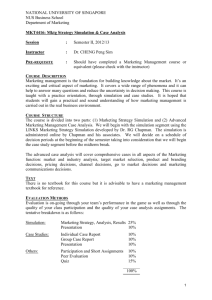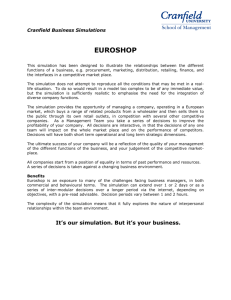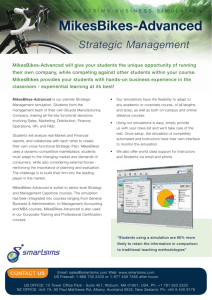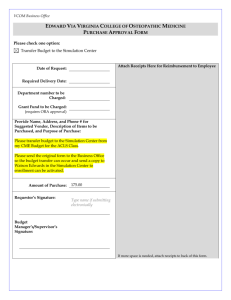Recanati
advertisement
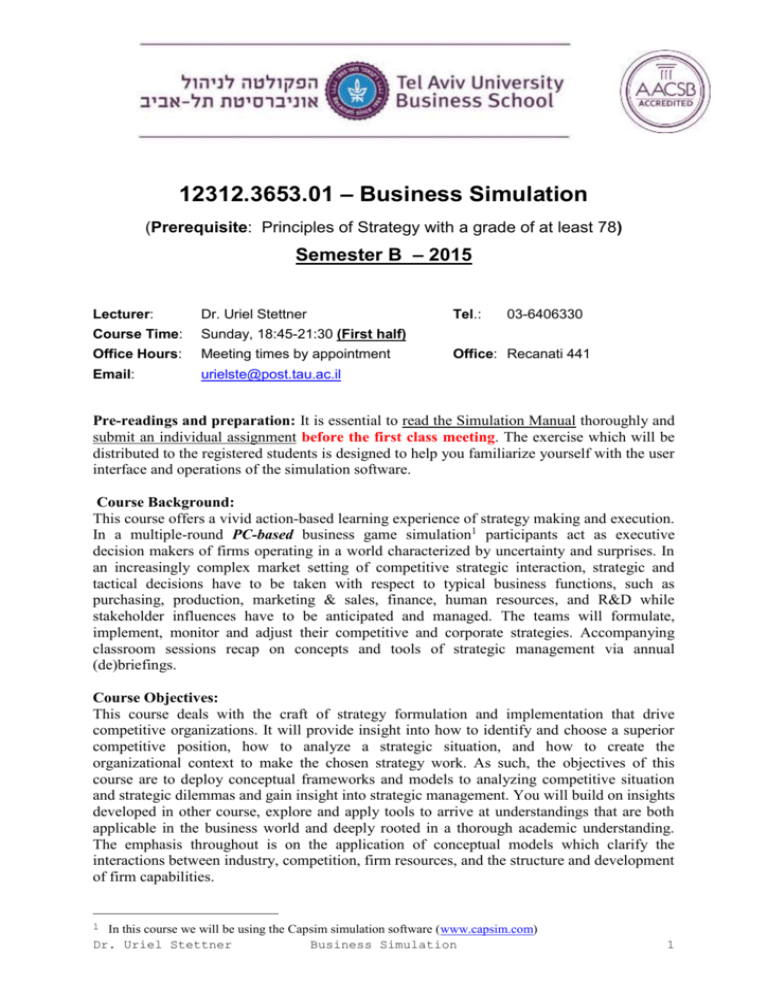
12312.3653.01 – Business Simulation (Prerequisite: Principles of Strategy with a grade of at least 78) Semester B – 2015 Lecturer: Dr. Uriel Stettner Course Time: Sunday, 18:45-21:30 (First half) Office Hours: Meeting times by appointment Email: urielste@post.tau.ac.il Tel.: 03-6406330 Office: Recanati 441 Pre-readings and preparation: It is essential to read the Simulation Manual thoroughly and submit an individual assignment before the first class meeting. The exercise which will be distributed to the registered students is designed to help you familiarize yourself with the user interface and operations of the simulation software. Course Background: This course offers a vivid action-based learning experience of strategy making and execution. In a multiple-round PC-based business game simulation1 participants act as executive decision makers of firms operating in a world characterized by uncertainty and surprises. In an increasingly complex market setting of competitive strategic interaction, strategic and tactical decisions have to be taken with respect to typical business functions, such as purchasing, production, marketing & sales, finance, human resources, and R&D while stakeholder influences have to be anticipated and managed. The teams will formulate, implement, monitor and adjust their competitive and corporate strategies. Accompanying classroom sessions recap on concepts and tools of strategic management via annual (de)briefings. Course Objectives: This course deals with the craft of strategy formulation and implementation that drive competitive organizations. It will provide insight into how to identify and choose a superior competitive position, how to analyze a strategic situation, and how to create the organizational context to make the chosen strategy work. As such, the objectives of this course are to deploy conceptual frameworks and models to analyzing competitive situation and strategic dilemmas and gain insight into strategic management. You will build on insights developed in other course, explore and apply tools to arrive at understandings that are both applicable in the business world and deeply rooted in a thorough academic understanding. The emphasis throughout is on the application of conceptual models which clarify the interactions between industry, competition, firm resources, and the structure and development of firm capabilities. 1 In this course we will be using the Capsim simulation software (www.capsim.com) Dr. Uriel Stettner Business Simulation 1 Teaching Language: This course will be taught in English and all assignments must be completed in English. Course Reading materials: All readings will be made available on Moodle. General grading policies: The course average will range between 83 and 87 in accordance with the grading policy at the Recanati Graduate School of Business Administration. Attendance: Students are expected to attend all lectures. If you do miss a class, it is your responsibility to find out from your teammates what material was covered, and what additional assignments or handouts you may have missed. Class participation: In this class, where discussion and team work is central to the learning process, a critical component is spirited, informed discussion. You should familiarize yourself with the assigned material, taking care to prepare thoroughly and be prepared to contribute informed responses to the material. The discussion in class will require application of theoretical concepts. In class, as well as in general business situations, there is more than one possible solution to a problem, and there may be no obvious answer to a question. Therefore, the quality of your comments depends on your capacity to communicate them and convince the class about their merits. Student Assessment: The assessment is based on team as well as individual performance. A maximum of 100 performance points (Pts) can be achieved. The distribution is shown in the subsequent figure. In general, firm performance will be determined as a function of a firms achievements on a Balanced Scorecard which includes a variety of performance measures including equity position, the firm’s short-term performance, and organizational as well as operational aspects. Team Assignments are graded on clarity and content. The opportunity to conduct an individual, extra-credit assignment will be given. The scope of individual assignment and its evaluation will be based on criteria defined in an individual contract. Dr. Uriel Stettner Business Simulation Page 2 Team assignment guidelines: You work in teams to prepare and submit team assignments. Your answer should not exceed the number of typewritten pages as indicated in the figure (with 1" margins, 12 point font, and 1.5 line spacing). Answers should demonstrate correct use of the theoretical concepts and relevant analytic frameworks as well as provide convincing arguments supported by simulation data. Your teams answers should be based on your own group’s analysis and reflect your original, individual, and independent thinking. The assignment to teams is not designed to divide labour between students but to benefit from interactive brainstorming, discussion, and comprehension. A submission should include the group members’ names, student id numbers, case title, and date on a separate cover page. The assignment due dates are specified in the detailed course layout. Late submissions will not be accepted. The written assignment will be submitted by a team member via the course website. Final Presentation: The purpose of the final presentation is to see how well you have mastered the concepts discussed in class, present your business/corporate strategy, explain your firm performance, and provide an assessment of your firm’s future. Each team is expected to defend its strategic in front of a panel of industry experts. The objectives of the presentations are to obtain constructive feedback from the course participants, the instructor, and the expert panel. You are expected to prepare an effective PowerPoint presentation that recaps the material of the corresponding session in the allotted time. Your analysis should demonstrate correct use of the theoretical concepts and relevant analytic frameworks as well as provide convincing arguments supported by data. Your team’s answers should be based on your own team’s analysis and reflect your original, individual, and independent thinking. The assignment to teams is not designed to divide labor between students but to benefit from interactive brainstorming, discussion, and comprehension. A submission should include the team members’ student id numbers and team id. The final presentation must be submitted at least two days before the class presentation. Late submissions will not be accepted. The presentation will be submitted by a team member via the course website. Plagiarism: Plagiarism refers to claiming ownership of words, ideas, and/or work of others. All work submitted under your name is assumed to be your product. It is unacceptable neither to submit the work that another wrote nor to copy materials without attribution. Detailed Business Simulation Course Outline Lecture # Subject Assignment Due Due Date 1 Practice Round 1 & 2 Read Manual & complete Individual Simulation Exercise Before Lecture 1 2 3 4 Competition Round 1 Competition Round 2 Competition Round 3 Development of Strategic Plan (SP) Before Lecture 3 5 6 7 Competition Round 4 Competition Round 5 Presentations Presentations 24 hours before Lecture 7 Note: Each Lecture will start with a debrief discussing the results of the previous round, and end with the discussion of a theoretical model or concept Dr. Uriel Stettner Business Simulation Page 3
